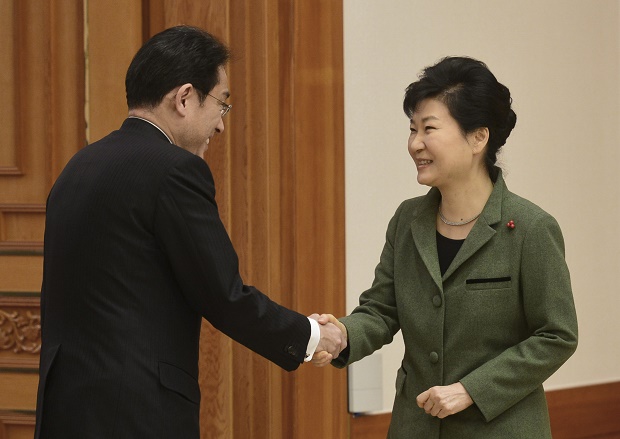S. Korean president defends landmark deal with Japan

South Korean President Park Geun-hye, right, shakes hands with Japanese Foreign Minister Fumio Kishida prior to a meeting at the presidential house in Seoul, South Korea, Monday, Dec. 28, 2015. The foreign ministers of South Korea and Japan said they had reached a deal meant to resolve a decades-long impasse over Korean women forced into Japanese military-run brothels during World War II, a potentially dramatic breakthrough between the Northeast Asian neighbors and rivals. Newsis via AP
SEOUL, South Korea—South Korean President Park Geun-Hye on Wednesday defended a landmark deal with Japan over wartime sex slaves, saying her government had tackled a “difficult problem” dodged by her predecessors.
Park acknowledged criticism of the deal, which has divided public opinion, but argued that her administration had secured the best possible outcome.
READ: South Korea ‘comfort women’ protest against Japan deal
“You can’t always be 100 percent satisfied in negotiations because there are various practical constraints,” she told an annual press conference.
Under the deal reached last month, Japan offered an apology and a one-billion yen ($8.3 million) compensation fund for 46 surviving Korean “comfort women”—forced to serve in Japanese military brothels during World War II.
Both countries described the settlement as “final and irreversible.”
READ: South Korea, Japan strike deal on ‘comfort women’
The plight of the comfort women is a hugely emotional issue that has marred South Korean ties with Japan for decades, and the December agreement triggered accusations of selling out to Tokyo.
But, with so few of the former sex slaves still alive, Park said the time had come to settle the issue.
“It was a very difficult problem that previous governments had not been able to properly deal with,” she said, warning Japanese politicians and media against undermining the deal.
“It is very difficult to convince the public if there are any more remarks that scar the victims,” Park said.